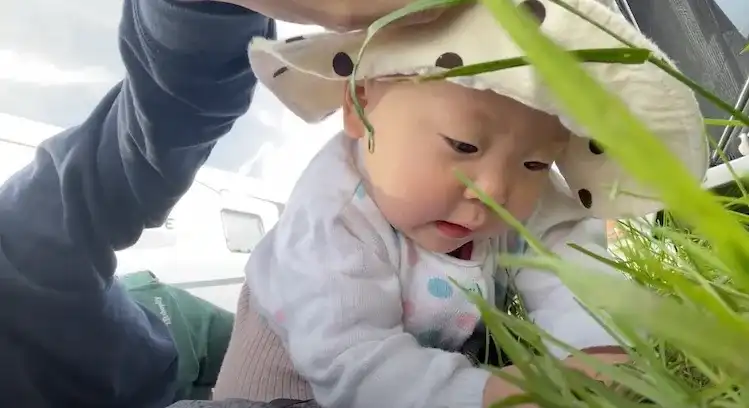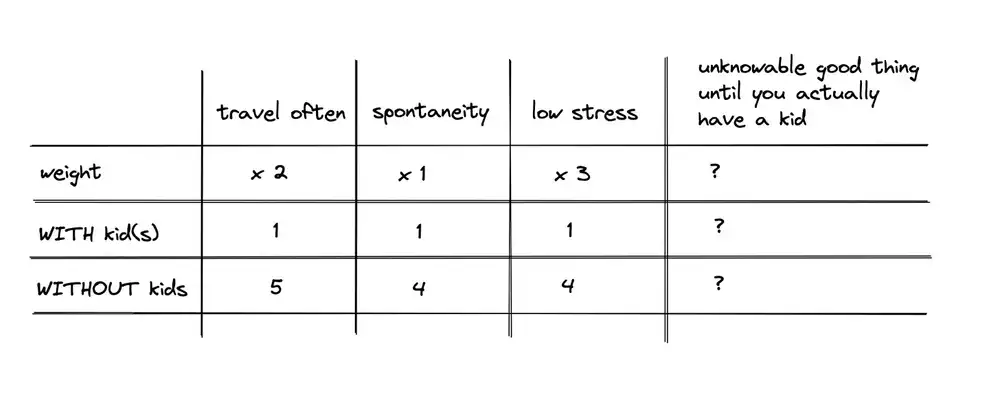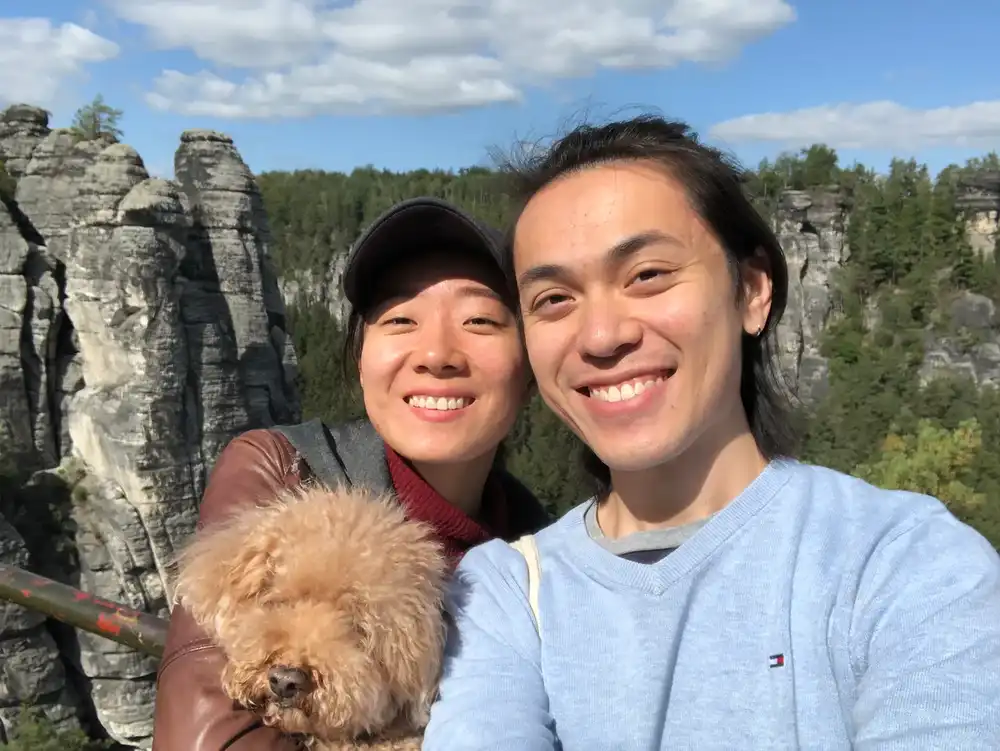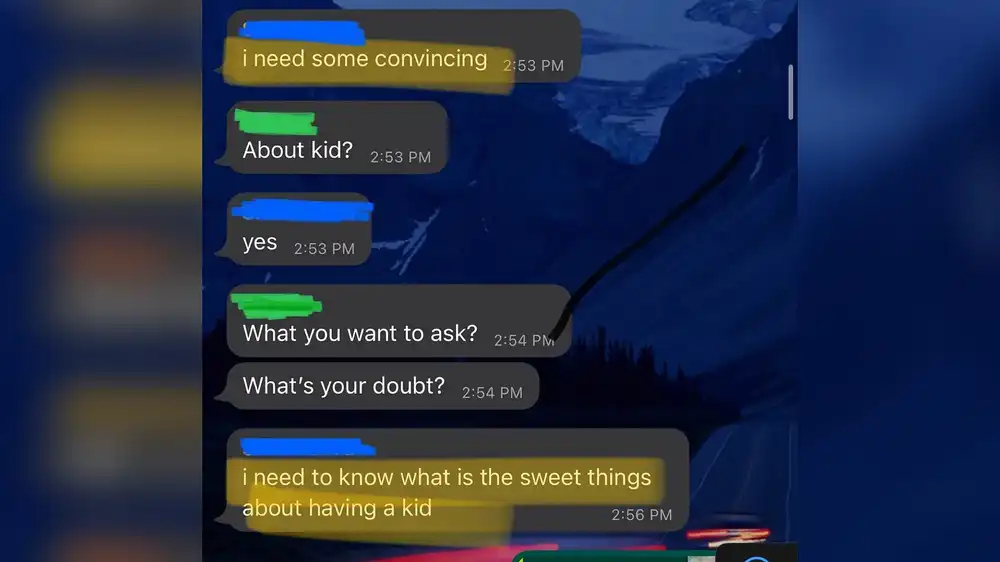Almost didn't have a baby
This is Part 1 of a two-, maybe three-, part series on how we almost decided not to have kids and become parents.
We could explore the world, cultures, art, business, and so on—things we are happily doing in Berlin now. I imagine we could find enough ‘unknowns’ in this world to explore till we draw our last breath. So why choose to explore the unknown of parenthood? What makes parenthood special among the unknowns?
That was me expressing to my friends in 2020 one of my many doubts about having a child and becoming a parent. There’s a lot more from that conversation that I’ll draw upon later, but suffice to say, Charlane and I did not know that we wanted to be parents. We agonised over the decision for years!
So, if you are in a similar stage in life, may this story of how we almost chose not to have kids be your companion.
But before we dive in, I feel the need to frame what’s to follow.
Firstly, I am not giving advice on whether or how to plan your family life. I am recounting facts from my journey to becoming a parent. I hope that by describing my journey you might find solace in knowing that someone else struggled to decide that perhaps you’re trying to come to yourself.
Secondly, if you are someone who knew in your soul that you’ve always wanted to be a parent - I am happy for you! - but in your case, this post will probably come off as overly dramatic and may not be worth your time.
Thirdly, I want to acknowledge that getting pregnant is not like buying a potato in the supermarket. There are forces at play that can prevent us from conceiving and it is in my opinion one of the greater tragedies of being intelligent animals. If you have decided to have a child but are having trouble conceiving, I am sorry! This post may or may not be for you; you’ll have to decide for yourself.
Lastly, a quick reminder that while I love writing this newsletter, it takes time to write. If you enjoy this post, please consider sharing it with someone who might enjoy it as well, and/or consider becoming a paying subscriber. Your support affords me more time to write, reply to you individually, and continue building this newsletter into the most honest and kind place on the internet (a pipedream).
 Here’s me trying to stop Charlotte from eating the fascinating grass.
Here’s me trying to stop Charlotte from eating the fascinating grass.
A heads up: I am now a parent and I love it! Keep that in mind as you read this essay, as it’s written by a not-sure-before-but-am-sure-now parent.
Because my path to parenthood resembles more a maze than a beeline, this post is likely going to be broad and meandering, and I’ll double-click on things that I think are interesting and leave out other details. If there is something you’d like me to expand on in a future post, let me know in the comments.
Alright, no further ado, let’s begin.
///
A good place to start is with a meta question: Why is it so hard to decide?
We resisted having a child for years. Friends and family would ask, “When are you guys going to have kids?” and we would say, “Probably next year. Not sure. But yeah, maybe next year.” I think we were like this because we’d been a two-person unit since 2006 (16 years ago) and we knew that having a kid would upend that status quo, so we resisted deciding for a very long time.
But looking back, I think that the fear of disequilibrium in our two-person relationship was not what made it difficult for us to decide. I think it has more to do with how improbable it is that we could make a sound decision in the face of the big Unknown.
I mean, how are we supposed to decide? Doing a pros-and-cons list (or a decision matrix that tries to account for multiple weighted factors) sounds like a good idea at first, but when I did it, I quickly realised that the points we would come up with would be so incomplete and inaccurate that we couldn’t possibly base our decision on them. Imperfect information, you don’t know what you don’t know, everything people say is subjective, something something… It was clear to me that using a list or matrix to decide would still involve a big element of faith. That’s what makes a decision that should be easy so hard!
 What a decision matrix would have looked like…
What a decision matrix would have looked like…
In the end, I think we came to our decision to have a kid by reasoning the parts that we could and then leaping out into the clouds of the Unknown, hoping that we’ll learn during freefall to deploy our parachutes and land softly.
///
So, let’s talk about the reasons. As in, the reasons we had for not wanting a kid. Prepare for some philosophy, explosions, and awkward questions. In no particular order…
A moral obligation?
This might be the biggest reason we deferred deciding on having a kid for so long. It’s a moral philosophy that I don’t think I read anywhere but somehow thought of and started to live by, and it’s this: I believe we have a moral obligation to live our lives as independent adults for a while before we have kids of our own because our parents gave up a lot to give us that gift.
Think about it: each of us is the child of parents who dedicated 20 years of the prime of their lives to help you grow into a fully-functioning adult capable of navigating this world and experiencing all of its splendours. What would it all be for if you shortly became a parent yourself when you entered adulthood? Who is enjoying this world? Is humanity supposed to be a ceaseless cycle of deferred gratification where nobody is actually gratified?
The way I thought about this was that if I haven’t really lived my life before I have a child, despite having had the chance to do so, I’m going to have to wait until I’m 50 to start, and that’s too damn late for me. I’m already feeling less energetic than I was in my 20s now that I’m in my early 30s - I imagine being lethargic like a sloth by the time I’m 50. Explore the world? Jump at business opportunities? Do (somewhat) crazy things? You kidding me? I’m going to stay in, sit in my oh-so-comfy lazy boy and watch TV, thank you very much.
Giving up the lifestyle we loved
The second reason is less controversial: we loved our lifestyle and did not want to give it up.
When we started seriously contemplating the decision, we were in our late 20s living in Berlin (having just moved from Singapore), making decent money, and had nobody in our families needing our long-term care. We were living on our terms and it was wonderful!
 Charlane, frizzy haired Brownie and I at the Saxon-Switzerland Mountains in 2020 just a few months before we found out we were expecting a child.
Charlane, frizzy haired Brownie and I at the Saxon-Switzerland Mountains in 2020 just a few months before we found out we were expecting a child.
We had a rough idea of what our next five years in Berlin were going to be like. I was going to deepen my career in tech and Charlane was going to explore a new handmade jewellery business. In our longer breaks, we’d maybe buy a campervan to travel around Europe, and in our pockets of time, we’d go rock climbing, walk in parks and swim in lakes, have meals with friends, work on side projects, or do things spontaneously. (That last bit about spontaneity? Yeah, that’s truly gone now as a parent.)
So there we were, clutching our goals under our armpits headed in the same direction when we broached the topic of having a baby. Everything went ka-boom-boom! We couldn’t see the even the near future with all the soot in our eyes!
Why fix what’s not broken?
We tried framing it differently and asked ourselves, is there something broken in our relationship that having a child could fix? There is a prevalent argument that gets bandied around that says that you need a child to complete and sustain your marriage. We examined this and asked ourselves if it was true, and both of us answered a resounding “no.”
We did not feel like we needed a kid to complete our marriage. We were (and still are) the kind of couple that felt comfortable being on our own (without family or a kid around). I think we challenge each other in a very healthy way, which I like to believe will keep us busy and fulfilled enough for a lifetime.
So why have kids? Why try and fix what’s not broken?
A possible major disruption to wellbeing
Anyone sensible will acknowledge that the burden of child-bearing lies disproportionately on women. Pregnancy is one of the most transformative experiences of the body, and not in a meditation retreat kind of way. Midway through her pregnancy, Charlane kindly asked me to imagine my balls swelling to 500 times their original size to help me relate. (I must have said something wrong at the time.)
So in one of our casual pre-decision talks, Charlane said she was worried that pregnancy would ruin her body and leave her irreversibly damaged in some ways physically. Mind and body being connected, she was understandably also concerned about post-partum depression and other ailments of the mind.
To be fair, I was worried about her well-being too, but I’ve always felt like my words rang hollow. We have a saying in Chinese - 站着说话不腰疼 (zhàn zhe shuō huà bù yāo téng) - which translates literally as “the one who stands idly talking is not the one with the backache.” So in the end this was something that Charlane, as the person who had to bear the child in her womb for nine months, had to come to terms with by herself.
Fearing inadequacy
We were also afraid we wouldn’t be able to cope with raising a child without the support of family or friends as we intended to continue living in Berlin. Didn’t someone say something about a village raising a child? Will we be able to bear the unceasing caregiver life without taking a you-stay-with-the-grandparents break once in a while?
Then there’s the fear that we might not be good enough as parents. We didn’t know a lot about kids back then but we did know this: if we were going to be parents, we were going to do it right and give the kid(s) a good upbringing. It is clear that raising a kid is a huge responsibility, so what if, we wondered, we were not “parents material” and our kid grows up to be miserable or bad for people?
A sense that life is suffering
Switching gears again to something philosophical, I realised recently that our subscription to the idea of “dukkha” in Buddhism was tinting our lenses when we talked about kids. Dukkha is, in my own words, the belief that life is suffering. Every living being is born into a life where suffering is a constant and the goal is to reduce or transcend it.
Within this worldview, as you can imagine, giving birth feels almost like a sin. To bring someone into this world is to have them suffer for a lifetime! Bleak, I know. A big part of me still sees things this way. I don’t think we had an answer to this one in the end. It still lingers, and when I think about it, I feel melancholic.
We didn’t even like kids!
We have a friend whose partner really wanted to be a parent. That can be a powerful clarifying force! But we didn’t have that.
Me? I honestly viewed most kids as a nuisance. They all seemed needy, wanting, not very helpful, and they behaved unpredictably. I used to pity parents when I see them, especially those who looked like they hadn’t slept in four years, like Frank Buffay Jr.
 Charlane has even less affinity with kids. Once, we happened to be eating at a hawker centre by Marina Bay in Singapore when the kid from the next table approached us to pat Brownie, our poodle, who was sitting on one of the red square stools.
Charlane has even less affinity with kids. Once, we happened to be eating at a hawker centre by Marina Bay in Singapore when the kid from the next table approached us to pat Brownie, our poodle, who was sitting on one of the red square stools.
“It’s so cute! What’s its name?” the girl asked.
“Oh, hi!” replied Charlane, surprised by the unexpected question. “His name is Brownie.”
“Hi Brownie!” she called excitedly as she stroked his head.
“We have a dog at home too! Her name is Velvet because she has smooth hair,” the girl added proudly.
Charlane nodded with interest (because they’re talking about dogs) and unhesitatingly asked, “Oh, that’s nice. Where do you live?”
I laughed out loud because at this point the girl had frozen and turned to look at her mother at the table next to us. Her mother managed a smile but was visibly perplexed by her daughter’s expression. At that moment, Charlane appeared to have no idea of what just happened. Why did the girl suddenly look so surprised?
“You just asked a little kid where she lives,” I said, trying my best to hold back my explosive laughter. “That’s scary, coming from a total stranger.”
“Are you going to kidnap her?” I blurted in jest.
I recount this story as though I’m better with kids. Truth is, neither of us cared for kids until we had Charlotte. To us, they were just extremely needy tiny humans who demanded everything to go their way all the time - a picture that I cannot say is beautiful and one that helped us feel like we shouldn’t create a child.
A gamble for a mystery prize
To compound the difficulty of deciding, if we had a kid and we brushed up against one of the many reasons for not having kids listed earlier, I knew there was a significant chance that we would develop resentment towards the kid or each other and lose the most important thing to both of us - our relationship.
The stakes are ridiculously high! Here’s how I articulated this worry to my friends:
In the off-chance that either of us really hates having a kid when we have one, what will happen? I mean, what are the options from that point onwards? You can’t give up on the kid. You don’t want to give up on your relationship. Then how? I think the chances of us hating having a kid is non-trivial. That’s why this whole thing is so scary for us.
When I gather all the reasons I mentioned, spread them on a table and consider them as a whole, it felt like deciding to have a kid was like gambling on our relationship and our cherished lifestyle for the chance to win a mystery prize. At best it could be a lifetime of happiness. At worst, it’s a crushed piece of paper with the words “you’ve been punk’d” inscribed by the devil itself.
///
We’ve now exhausted our inquiry by asking the question “why we should not have a kid,” which I think is a natural starting point for us who cherished our status quo of being married without kids.
So next we asked, “what are some good reasons to have kids?”
We thought it would be helpful to try and understand the perspectives of people who already wanted to be or were already parents. Luckily for us, we had a perfect group of friends like that to ask. We all hung out in a WhatsApp group, so we posed this question to them: “What are the sweet things about having a kid?”

The conversation we had with our friends
Here are some of the answers we got. Bolded texts are added by me for emphasising what I thought was the gist of the answer.
When we asked the friend who was already a parent, he said:
“For me, having a kid means that I know a part of me will continue to grow even when I’m not around 50 or 60 years later”
Doesn’t answer the question, but this was heartfelt, so we went along. When we asked if it is a legacy thing, he said no, and expanded on what he was trying to say:
”Having impact on a person’s life and through that, leaving a good part of me around in the kid, who then is able to make an impact on someone else’s life later on”
So that started us down the path of “why would you want to be a parent?”, which was honestly a more well-framed, direct question. But I did wonder why nobody answered the original question of “what are the sweet things about having a kid?”
Anyway, following that line of inquiry, another friend in the group who was not yet a parent at the time (but is now!) chimed in with these disparate reasons:
“So I don’t feel like I didn’t do anything for the world”
“The journey of bringing up a child is a challenge that I want to experience and excel in”
“I cannot imagine staring at (partner’s name) for the rest of my life with no changes. Like… I want to do something meaningful together and grow together”
“It’s like… do you want to have another person that you will love unconditionally in your life?”
This person’s partner, who was also in the group chat, simply said,
“I just love kids 😂.”
Looking back at this conversation now, I think what was most illuminating was to realise that we each have a unique set of reasons for doing things, including whether or not to become parents. With this insight, I now knew that I needed to look inward for my reasons.
I care a lot
In the end, we only managed to come up with one reason. One. It was my reason and it is this: I craved the opportunity to pour my heart and soul into caring for and nurturing someone else (besides my partner, because that’s a different kind of care).
Thinking about it now, this might be the oldest desire I’ve had that has never been fulfilled. I’m guessing it has something to do with wanting what you don’t have since I’m the youngest of three children and I didn’t have anyone who is behind me (in the journey of life) to love.
Anyway, in hindsight, this might have been the reason that got us to seriously consider becoming parents. If I had not had this weird itch to care for someone younger than me, Charlane and I would probably not have Charlotte right now, and I most certainly wouldn’t be writing this essay to share our story. We would have been just another couple who decided to live happily on their terms without burdening themselves with the weight of raising a child.
My itch served as the nucleus for other motivations to coalesce around. Or—perhaps it’s more accurate to describe it this way—it catalyzed for us to come up with justifications to have a baby.
I think this is worth saying again: between Charlane and me, we only had a single motivation with which we eventually decided to take a chance to have a baby. I’m surprised by this. Are you? I mean, just a single, silly reason? Maybe that’s all it takes…
